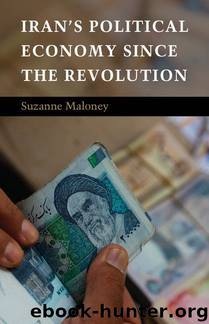Iran's Political Economy since the Revolution by Suzanne Maloney

Author:Suzanne Maloney [Maloney, Suzanne]
Language: eng
Format: epub
Publisher: Cambridge University Press
Published: 2015-08-30T21:00:00+00:00
Targeting Karbaschi
During Khatami's tenure, the persistent use of allegations of financial impropriety to target political rivals intensified. The inequities of the reconstruction era boom and bust continued to draw public ire, and conservatives fulminated against consumerism and the encroachment of Western goods. One Kayhan editorialist equated economic reform with greed and despotism, calling capitalists “this wealthy and prosperous class, which has no interest in preserving the ideals of the revolution and only wants revolution to continue for the sake preserving its capital, has become a filthy sore in society's economic and social body, and the elimination of its dangers and the harm it has caused will be more difficult than many of the development programs.”55
Tehran Mayor Gholamhusayn Karbaschi offered a tempting mark for chastening the new entrepreneurial class and cowing their political ambitions as well. His ambitious urban development programs earned him broad support from Tehranis who benefited from improvements in city services and facilities. However, these same programs – and the tactics, such as new taxes and preemptive fines, that enabled Karbaschi to undertake them – also affronted the traditional commercial sector, as did his strident campaigning on behalf of Khatami. In the politicized postelection atmosphere, Karbaschi's 1998 arrest and trial quickly became a battle of good versus evil, televised nightly to a rapt national audience. And though his conviction was interpreted by observers of the Iranian political scene as a setback for political liberalization, the consequences were perhaps more ambiguous.
The Karbaschi verdict evidenced a shift in the political discourse over the nature of the Islamic Republic's economy, consistent with the reform-era obsession with rule of law. The arguments from both sides over the propriety of Karbaschi's business dealings largely focused on efficiency and equality before the law, avoiding for the most part the issues of Islamic doctrine that so divided the clerics, or even the standard populist homage to concerns of social justice. In addition, the debate among the general public centered not on these issues or on the strict legality of his actions – many Tehranis openly conceded that the mayor may well have violated laws on land development and appropriations – but on the greater national good. In the Karbaschi episode, popular sentiment sided with the proponents of political reform, but ironically, against the interests of financial transparency. However, in Iran's fluid factional contention, declining material well-being eventually galvanized outrage over corruption and the disregard of the revolution's redistributive mandate.
What was most remarkable about the Karbaschi conviction was how limited the ripples within society proved to be in response to his plight. The mayor whose reimagination of the massive capital city had improved the lives of millions commanded only the most limited sympathy within the hearts of his constituents. And the arrest of a popular, transformative figure was greeted by the population not as an outrage against what was right, but as yet another indication of the broader corruption of the system itself. The deal struck on Karbaschi's behalf, limiting his prison term and presumably incorporating
Download
This site does not store any files on its server. We only index and link to content provided by other sites. Please contact the content providers to delete copyright contents if any and email us, we'll remove relevant links or contents immediately.
| Arms Control | Diplomacy |
| Security | Trades & Tariffs |
| Treaties | African |
| Asian | Australian & Oceanian |
| Canadian | Caribbean & Latin American |
| European | Middle Eastern |
| Russian & Former Soviet Union |
The Secret History by Donna Tartt(19048)
The Social Justice Warrior Handbook by Lisa De Pasquale(12187)
Thirteen Reasons Why by Jay Asher(8893)
This Is How You Lose Her by Junot Diaz(6877)
Weapons of Math Destruction by Cathy O'Neil(6264)
Zero to One by Peter Thiel(5786)
Beartown by Fredrik Backman(5737)
The Myth of the Strong Leader by Archie Brown(5498)
The Fire Next Time by James Baldwin(5431)
How Democracies Die by Steven Levitsky & Daniel Ziblatt(5213)
Promise Me, Dad by Joe Biden(5141)
Stone's Rules by Roger Stone(5081)
A Higher Loyalty: Truth, Lies, and Leadership by James Comey(4952)
100 Deadly Skills by Clint Emerson(4920)
Rise and Kill First by Ronen Bergman(4779)
Secrecy World by Jake Bernstein(4740)
The David Icke Guide to the Global Conspiracy (and how to end it) by David Icke(4701)
The Farm by Tom Rob Smith(4502)
The Doomsday Machine by Daniel Ellsberg(4484)
